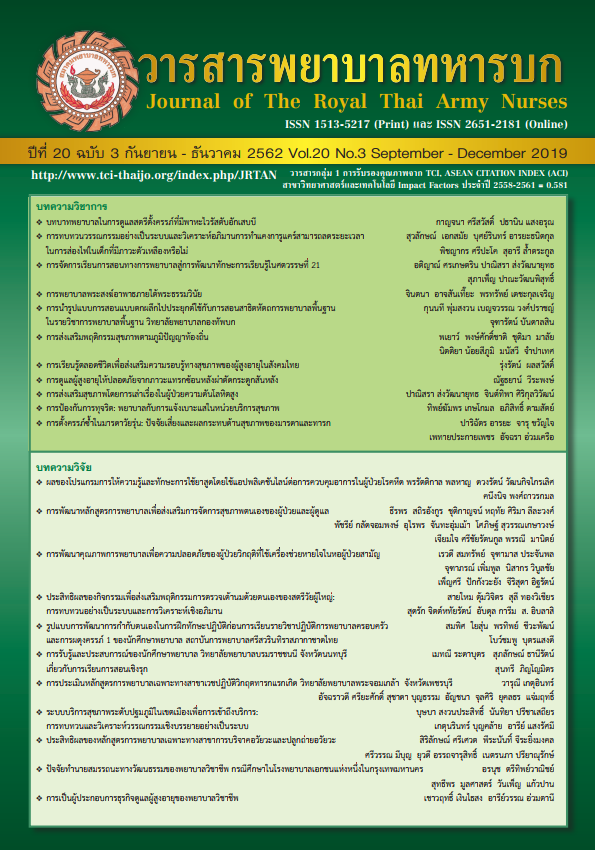Satisfaction of Graduate Users towards the Competencies of Master Degree graduate of Nursing Science Program in Nursing Administration, School of Nursing, Eastern Asia University
Keywords:
Satisfaction of Graduate Users, competencies of Master Degree Scholar, Nursing AdministrationAbstract
This research is the Descriptive Research and has objectives to study Competency Satisfaction of Master Degree graduate users in Master Degree graduate of Nursing Science Program in Nursing Administration of Eastern Asia University and to compare the competency satisfaction of graduate users of Master Degree scholar distinguished by educational levels, positions, types of organization and the duration of times spent with the Master Degree graduates. Sample group is the graduate users in to total of 103 people. Research instrument is the Master Degree Users’ Satisfaction Questionnaire Form that has Cronbach alpha coefficient equals to 0.95. Statistics used in data analysis are frequency, percentage, average, standard deviation, Independent t-test and One Way ANOVA. Thus, research results found that the level of Master Degree users towards the Master’s competency is in high level ( = 4.07, SD = .43), Master Degree graduate has the highest moral aspect capacity of (
= 4.25, SD = .47) and the lowest intelligence is average to 3.97 (SD = .48). In addition, it is also found that the satisfaction towards research doing or research participation after graduation is in medium level. Master Degree graduate users that have differences in the topic of educational levels, positions, types of organization and the duration of times spent together with the Master Degree graduate have no different satisfaction in overall towards the capacity in the statistical significant level of .05. However, in each individual aspect, it is found that in interpersonal and responsibility aspects, Master Degree graduate users have more satisfaction in Master Degree’s capacity than Bachelor level and Doctor of Philosophy Degree in the statistical significant level of .05. From research results, recommend to suggest educational institute should improve the learning and teaching of research subject and the using of English language should have an in-depth research study about the capacity of interpersonal and responsibility from the graduate and Master Degree users in order to find the differences and to continue to bring forward as suggestions in curriculum improvement.
Downloads
References
2. Khunthar, A. The Impacts and Solutions to Nursing Workforce Shortage in Thailand, Journal of Nursing Science. 2014 :81-90. (In Thai)
3. Ministry of Education. Ministry of Education Announcement about Thai Qualifications Framework for Higher Education in Nursing Science. Bangkok: Ministry of Education; 2009. (In Thai)
4. McHugh M.D, Lake E.T; Understanding Clinical Expertise : Nurse Education, Experience, and the Hospital Context. Res Nurs Health. 2010;(33) : 276–287.
5. Henrich J. ; Competency-based education : The employers’ perspective of higher education. The Journal of Competency-Base Education. 2016; (1):122-129.
6. Amarach B.H, Abualrb R.F.; Co-workers’ support and job performance among nurses in Jordanian hospitals.Journal of Research in Nursing., 2009; (15) : 391–401.
7. Theisen, J.L. & Sandau, K.E. .Competency of New Graduate Nurses: A Review of Their Weaknesses and Strategies for Success. The Journal of Continuing Education in Nursing. 2013; 44(9) : 406-414.
8. Benner P.Form novice to expert: Excellence and power in clinical nursing practice. Menlo Park, CA: Addison-Wesley; 1984.
9. Siripukdeekan C, Boonrubpayap, B. Nursing Career Ladder Development. Journal of The Royal Thai Army Nurses 2014; (15) : 75-80. (In Thai)
10. Yotongyos M, Sawassdeep,P. Sample size for research design.Bangkok : Academic Service Center, Institution of Research and Development. (In Thai)
11. Srisa - ard B. Preliminary research. 5thed. Bangkok: SE-ED; 2010. (In Thai)
12. Eastern Asia School of Nursing..Master of Nursing Science Program. (Nursing Administration) B.E.2550. School of Nursing. Pathumthani: Eastern Asia School of Nursing; 2007. (In Thai)
13. Pleankaew P, Poungjuntaradej N. Satisfaction of the Employers toward Competencies for Graduate Nurses, Polic Nursing College. Journal of the Polish Nurses 2017; 8 : 136-44. (In Thai)
14. Phumkokrux S, Sukonthasarn A., Wongwiriyapun A., Liewtraku, T. & Nakhapa W. Desired Characteristics of Graduates from Faculty of Nursing, Chiang Mai University as Perceived by their Supervisors/ Employers. Nursing Journal 2016; 43. (Supplement): 151-61. (In Thai).
15. Sangsanguan, W. & Wanaku, T. The Stakeholders Satisfaction and Expectations toward Bachelor degree of Nursing, Eastern Asia University. Journal of The Royal Thai Army Nurses. 2018;213-221.(In Thai).
16. Fan Y, Li Q, Yang S, Guo Y, Yang L., Zhao S. Developing Tools for Identifying Employer and Employee Satisfaction of Nursing New Graduates in China. Scientific World Journal. Published online doi: 10.1155/2014/384649.
Downloads
Published
How to Cite
Issue
Section
License
บทความหรือข้อคิดเห็นใดใดที่ปรากฏในวารสารพยาบาลทหารบกเป็นวรรณกรรมของผู้เขียน ซึ่งบรรณาธิการหรือสมาคมพยาบาลทหารบก ไม่จำเป็นต้องเห็นด้วย
บทความที่ได้รับการตีพิมพ์เป็นลิขสิทธิ์ของวารสารพยาบาลทหารบก
The ideas and opinions expressed in the Journal of The Royal Thai Army Nurses are those of the authors and not necessarily those
of the editor or Royal Thai Army Nurses Association.






